Poodle
Poodles are regarded as one of the most intelligent dog breeds. They are quick learners, making them very easy to train. Due to this reason, they perform well in dog sports and dog shows as they excel in agility and obedience type tasks. They also make great family pets as they are well-behaved, affectionate, loyal and family-friendly. Another reason for their popularity is their hypoallergenic, low-shedding coat. As well as being ideal for people with allergies, their curly, dense coat also means that furniture stays hair free compared to other breeds that shed a lot.
Quick Facts about Poodles
| Types | Standard poodle Miniature poodle Toy poodle |
| Size | Standard Poodle: Height: Around 38cm Weight: 20 – 32kg Miniature Poodle: Height: 25-38 cm Weight: 4.5-7 kg Toy Poodle: Height: Up to 25 cm Weight: 1.8-2.7 kg |
| Lifespan | Average poodle lifespan is 12 – 15 years. Life expectancy for toy poodles can be up to 18 years. |
| Suitable | For active families with children, For singles and seniors, For people with allergies, |
| Health | Typical poodle health issues are: hip dysplasia, progressive retinal atrophy, epilepsy, Addison's disease, and bloat. |
Love your Poodle? Protect them with the right cover.
Trainability
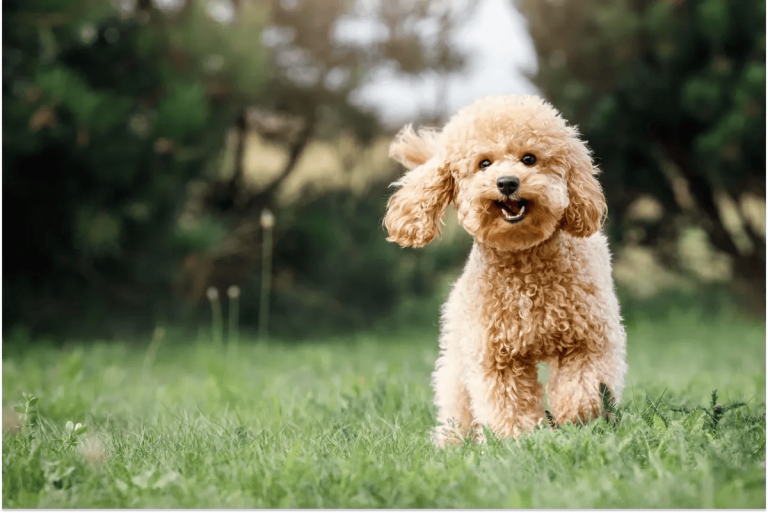
Poodles are one of the most trainable dog breeds. This is due to their high intelligence, ability to learn things quickly and eagerness to please. They are quick to understand new commands and find it easy to learn complex tasks. Understandably, this makes them a popular choice for obedience competitions, agility sports and dog shows. As well as making great family pets, typical poodle traits mean they are also ideal as service dogs, therapy dogs and working dogs. Poodles respond best to positive reinforcement techniques and consistency with commands and routines. As they are such intelligent dogs, poodles need a lot of metal stimulation along with short, fun training sessions. It’s a good idea to enrol your poodle dog puppy in obedience classes, followed by advanced training as they mature. This provides both physical and mental exercise and makes good use of your poodle’s natural intelligence and willingness to learn.
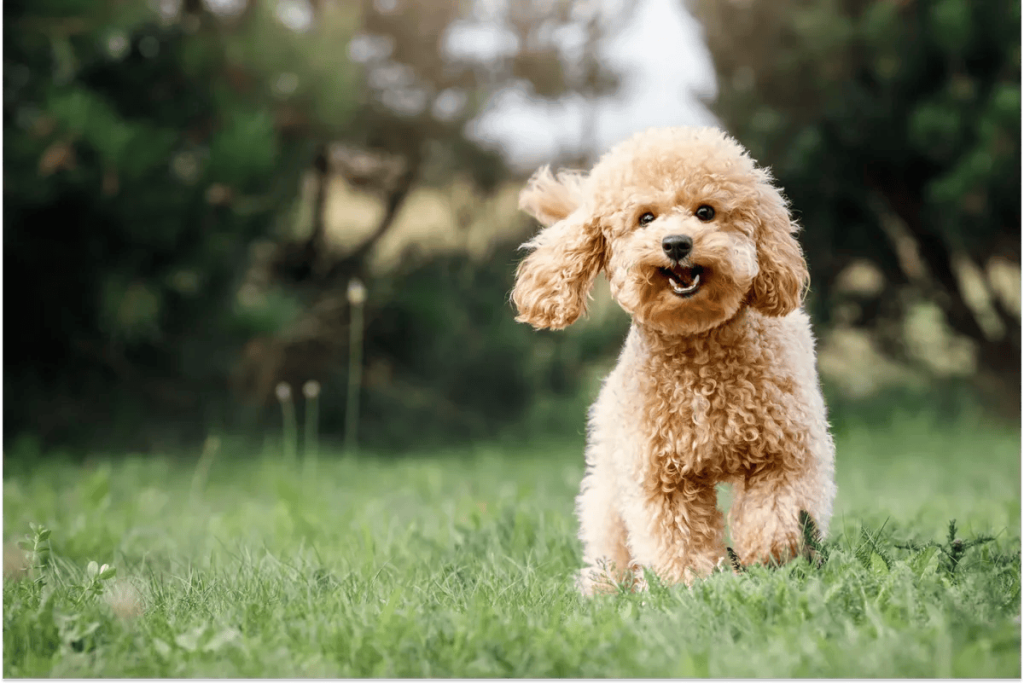
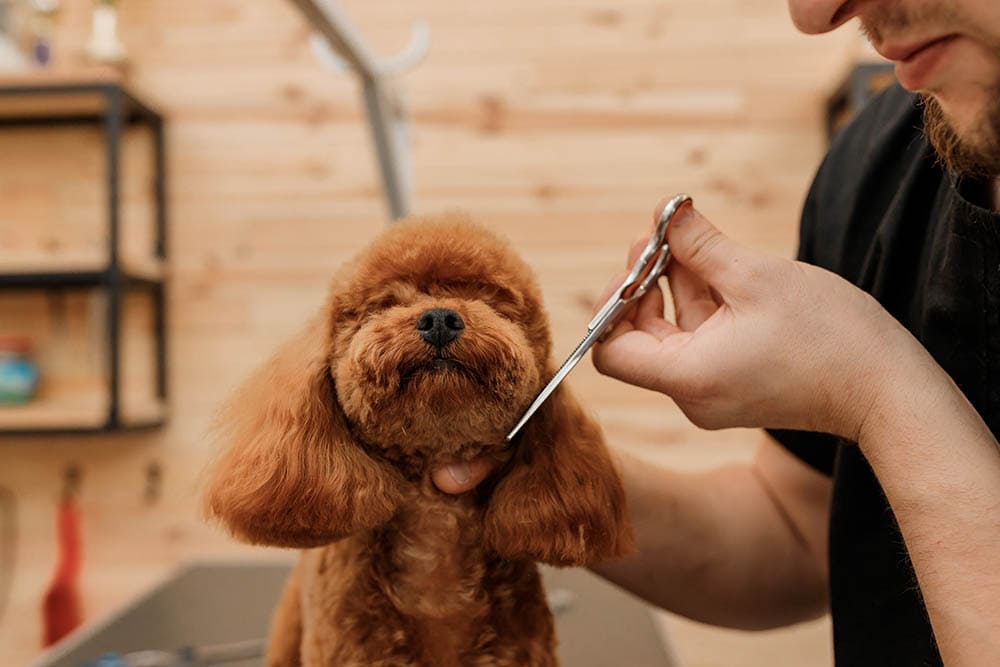
Grooming Requirements - Keeping Your Poodle Looking Great

Poodles are a very popular breed due to their low-shedding coat. However, poodles still require regular grooming to ensure coat health and to keep them looking their best. Their curly, dense coat needs regular brushing to keep their coat shiny and mat-free. Daily brushes along with professional grooming sessions every 4-6 weeks is recommended. As well as keeping their coat trimmed, the groomer can also check for any skin issues that poodles are prone to. When bathing your poodle, use lukewarm water with a gentle dog shampoo and rinse thoroughly to avoid skin irritations. As a general guide, poodles can be bathed and their nails trimmed every 3 – 4 weeks, with ear-cleaning and teeth brushing to be done on a more regular basis to prevent infections and dental issues.
Protect Your Pet Today
Your pet’s health is priceless. Don’t leave it up to chance.
See What Our Clients Have to Say
Common Health Concerns – Keeping Your Poodle Healthy
-
Hip Dysplasia:
- A genetic condition where the hip joint doesn’t fit properly into the hip sockets, which can lead to arthritis.
- Diet: Ensure a healthy weight is maintained to reduce stress on the hips. Give joint supplements like glucosamine and chondroitin.
- Exercise: Avoid high-impact activities, instead focussing on moderate, low-impact exercises such as swimming and walking.
- Vet check-ups: Regular check-ups are essential to monitor joint health and arthritis issues.
-
Progress Retinal Atrophy (PRA):
- A genetic disorder that causes the gradual deterioration of the retina which can lead to blindness.
- Diet: A diet rich in antioxidants, such as colourful fruits and vegetables, can help support eye health.
- Exercise: Make sure the environment is hazard free as vision diminishes.
- Vet check-ups: Regular eye examinations by a veterinary ophthalmologist can diagnose the condition early.
-
Addison’s Disease:
- A disorder of the adrenal glands which causes insufficient production of hormones.
- Diet: A balanced diet with regular feeding times to avoid stress.
- Exercise: Regular but moderate exercise to avoid stress.
- Vet check-ups: Regular blood tests to monitor hormone levels and adjust medications if needed.
-
Gastric Dilatation-Volvulus (Bloat):
- With this life-threatening condition, the stomach fills with gas and twists.
- Diet: Give smaller, frequent meals and avoid vigorous exercises immediately after eating.
- Exercise: Encourage calm activities around feeding.
- Vet check-ups: Get immediate care if bloat is suspected.
-
Hypothyroidism:
- An underactive thyroid gland which leads to weight gain, lethargy and skin issues.
- Diet: Low calorie diet for weight gain. Focus on high-quality protein intake.
- Exercise: Regular exercise to maintain healthy weight.
- Vet check-ups: Regular blood tests to monitor thyroid hormone levels. Adjust medication as needed.
-
Epilepsy:
- A neurological disorder that causes seizures.
- Diet: A consistent diet with added omega-3 fatty acids to support brain health.
- Exercise: Regular, moderate exercise to reduce stress.
- Vet check-ups: Regular visits to monitor and adjust medication as needed.
-
Patellar Luxation:
- Dislocation of the kneecap which causes lameness and pain.
- Diet: A healthy diet to avoid weight gain which can put extra stress on knees.
- Exercise: Low-impact activities like swimming and walking.
- Vet check-ups: Regular visits to monitor the condition and discuss surgical options if needed.
-
Sebaceous Adenitis:
- An inflammatory disease of the sebaceous glands in the skin which leads to hair loss and skin problems.
- Diet: A diet rich in essential fatty acids to support skin health.
- Exercise: Regular exercise to maintain good overall health.
- Vet check-ups: Regular visits to manage symptoms with medications and special shampoos.
-
Ear infections:
- Floppy ears on poodles can trap moisture leading to infections.
- Diet: A balanced diet to support overall health and immune function.
- Exercise: Regular exercise to maintain good overall health.
- Vet check-ups: Regular ear cleaning and check-ups to prevent and treat infections.
Looking to protect your pet? Learn more about our dog insurance for your Poodle here.
Cuddly - Affectionate and Loving

Poodle dogs are well-known for being affectionate and loving. They form very strong bonds with their owners and physical closeness reassures them, strengthening this bond. Poodles thrive on interaction and companionship, so they have a tendency to be cuddly. You can ensure your poodle feels loved and secure by incorporating the following into your routine:
- Spend quality time with your poodle through activities and giving them lots of attention.
- Provide physical attention through cuddles and lots of patting, stroking and grooming.
- Use positive reinforcement including praise, treats and affection, as well as calm, clear communication and verbal clues.
- Provide regular training activities and mental stimulation to keep their intelligent minds busy.
- Ensure your poodle has a consistent daily routine with clear boundaries and rules with regular socialisation with other dogs.

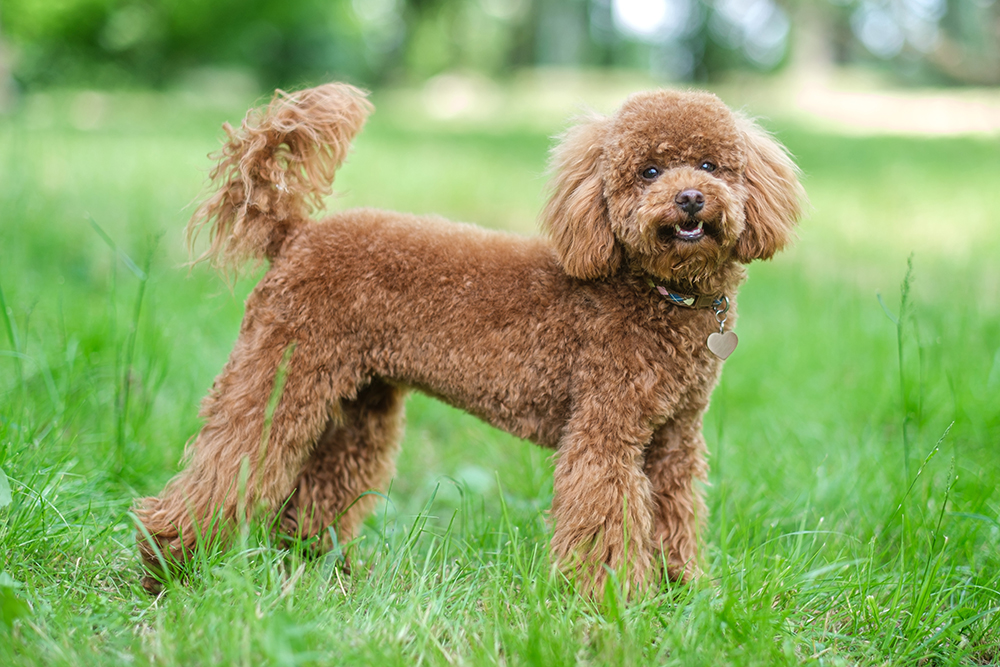
Shedding and Smell - Managing Shedding and Odor

Poodles are a popular household breed because they have hair rather than fur. Hair coats tend to shed less than fur with any hairs getting trapped in their dense, curly coats. This can reduce the amount of hair around the house, but poodles do need regular grooming as their hair continuously grows, just like humans.
Daily brushing will help to remove any loose hair and prevent matting. Then professional grooming every 4 -6 weeks will keep their coat trimmed, which in turn reduces shedding. Regular baths every 3 -4 weeks using a gentle dog shampoo will keep your poodle’s coat clean and odour free, as well as removing any trapped hair. Remember to also wash their bedding regularly to prevent unwanted odours. Cleaning their ears and teeth at least weekly will also prevent nasty smells and bad doggy breath, keeping your poodle happy and healthy.
Exercise Requirements - Do Poodles Need a Lot of Exercise?

Being a lively, energetic breed, poodles require regular and consistent physical exercise. How much exercise depends on the size and type of the poodle, with the larger standard poodle needing more exercise than the miniature or toy poodle. As a general guide, standard poodles need at least 60 minutes per day, miniature poodles around 30 – 45 minutes per day and toy poodles, being the smallest, need around 20 – 30 minutes per day. Poodles benefit from a variety of physical activities such as daily walks, agility training, engaging games and swimming. Including a mix of physical activities, mental stimulation and social play activities with other dogs is also essential to prevent boredom. Use exercise time to reinforce training commands and engage your poodle’s mind. Depending on your poodle’s size, age and health, you can incorporate physical activities, play time and social play throughout the day. This will help to keep your poodle happy and healthy. For example, a daily exercise schedule could start with a brisk morning walk, with a longer walk in the evening combined with a few interactive playtime sessions and some agility training during the day.

Intelligence - Are Poodles Smart?
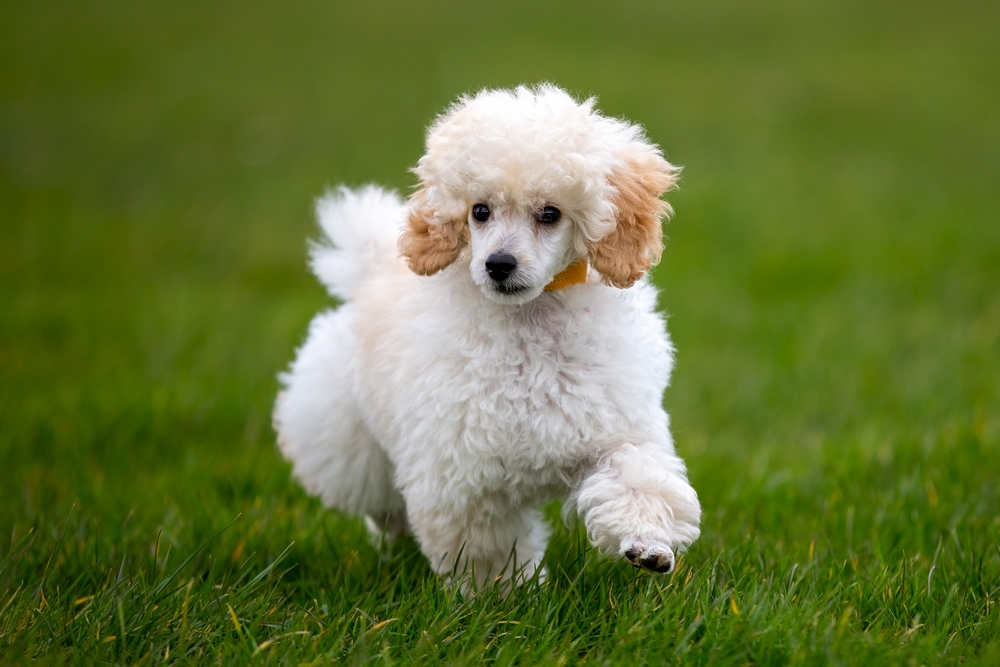
You only need to look at poodles in their roles as service and working dogs to know that poodles are smart. Their intelligence means that they are highly trainable and have very good problem-solving skills. By incorporating a variety of activities into your poodle’s routine, you can harness this intelligence in a positive way to ensure good behaviour.
To keep their curious and active minds stimulated, consider the following tips:
- Use toys that make them work for their treats along with interactive, challenging games. Don’t forget to rotate toys and games to maintain interest.
- Take different routes on your regular walks to expose them to new people, dogs, sights, sounds and smells.
- Regularly teach new tricks and commands to prevent boredom.
- Enrol your poodle in dog sports or obedience classes that require concentration and continuous learning.


Family Friendly- Are Poodles Friendly?

There’s no doubt that poodles are family friendly, making them an ideal choice for family pets. Poodles are affectionate, gentle and loving, making them great companions for children and adults alike. Poodles can adapt well to living in apartments, or houses with gardens so they are suitable for different lifestyles. What’s more, their friendly nature means they get along with other pets and animals as long as they are properly socialised from an early age. As they are intelligent and easy to train, they are typically well-behaved as a household pet.
Indoor/outdoor? - Ideal Living Conditions
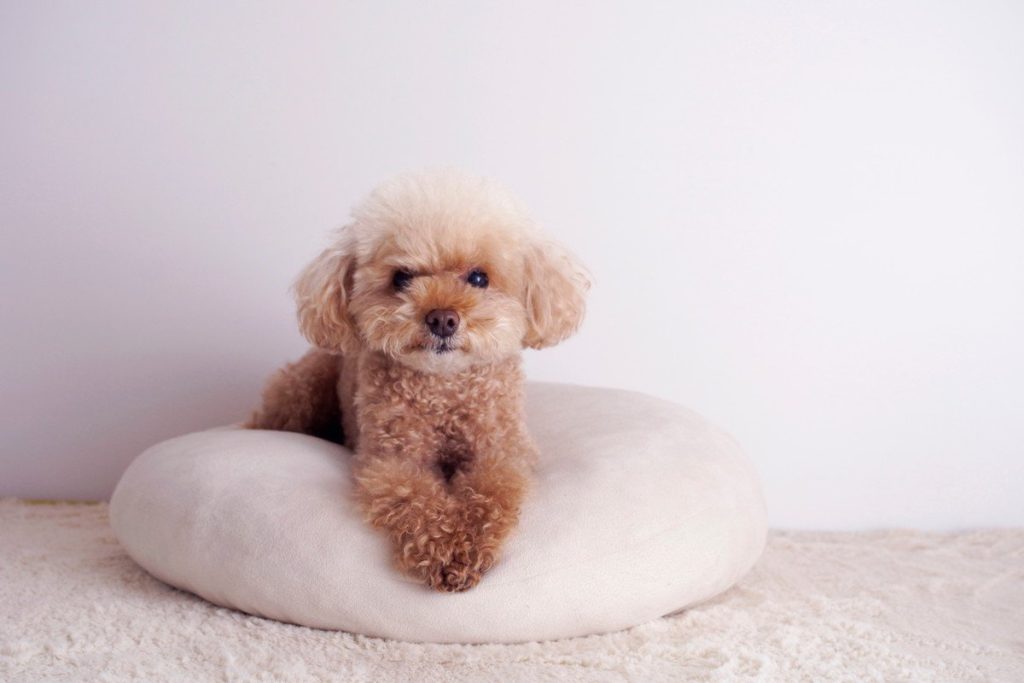
Poodles are better suited for indoor rather than outdoor living. They can be sensitive to colder temperatures so they are more comfortable in temperature-controlled environments. In addition, their coats require regular grooming so living outdoors would result in even more baths and brushing for you and the poodle. As the poodle temperament thrives on social interactions, being indoors also allows them to be more involved in family activities. It’s also important to note that poodles can also experience separation anxiety if left alone for too long.
There are a few easy ways that you can create a comfortable, indoor living environment to suit the characteristics of poodles including:
- Set up a comfortable and supportive dog bed in a quiet, cozy, warm spot.
- Heat or cool your home to maintain a comfortable temperature throughout the year.
- Provide interactive toys, puzzle feeders and chew toys to keep your poodle engaged.
- Keep living areas clean and regularly groom your poodle to keep their coat healthy.

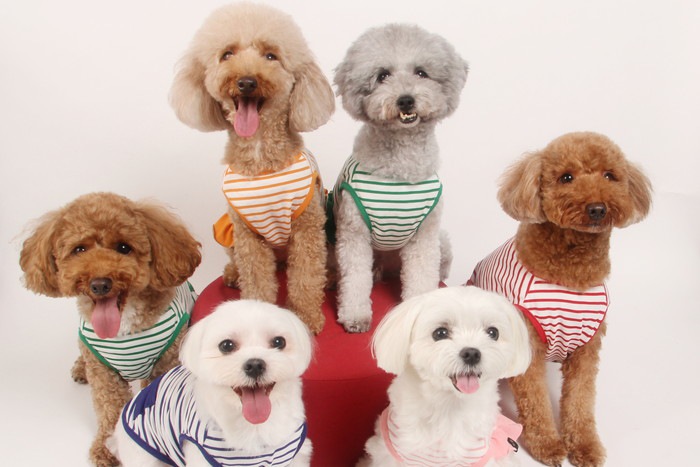
Responsible Breeding

Before buying from a breeder, do as much research as possible. This includes paying a visit to see the facilities as well as observing the poodle puppies and the puppy’s parents first-hand. Don’t be afraid to ask questions, ask for references or request a written contract that includes health guarantees.
In order to spot puppy mills, look for red flags such as there being multiple breeds, a high volume of puppies or the breeder refusing to show you around the facilities. Avoid buying puppies online and check for official documentation like vaccination history. Also, look out for puppies that appear ill, unsocialised or have poor living conditions.
By selecting a reputable breeder, you can make sure you are supporting ethical practices within the dog breeding community.
Contact PIA for Pet Insurance for Your Poodle
PIA is a family owned pet insurance company for Australia, and we have a long and successful history of helping owners care for their Poodles. Contact us today to learn more about our range of simple, flexible and affordable cover options.

